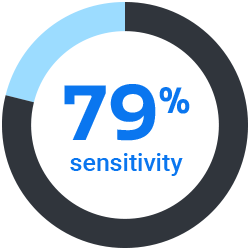
IDEXX Cancer Dx testing
A revolutionary new canine cancer diagnostic is now available to help you detect lymphoma earlier.1 And soon, detect mast cell tumors as well.
Find cancer early. So you can fight it early.
Cancer is a leading cause of death in canines, with 1 in 4 dogs in the U.S. expected to be diagnosed with cancer in their lifetime.2 With 73% of pet owners interested in having a cancer screening test for their pet, now you can offer them one.3
The revolutionary technology behind IDEXX Cancer Dx testing detects proprietary biomarkers specific to canine lymphoma and soon, mast cell tumors, accounting for more than 1/3 of canine cancer cases.4
Cancer testing with extraordinary capabilities.

Accurately detect canine lymphoma up to 6–8 months before clinical signs,5 with mast cell tumor detection coming soon.

Get clear, actionable “consistent with” or “inconsistent with” results by cancer type.

Can be affordably and easily incorporated into testing for sick pets and IDEXX Preventive Care profiles for at-risk dogs.†

Actionable next-step guidance from world-class oncologists.
First lymphoma. Next it’s mast cell tumors.
Last year, IDEXX Cancer Dx testing made a transformative leap in cancer care, with the ability to detect lymphoma earlier than ever before.1 But soon, we’ll take that leap even further by incorporating a test for mast cell tumors.

Find masses en masse.
As IDEXX Cancer Dx testing expands, veterinarians will have access to early detection of lymphoma and mast cell tumors, which account for over 1/3 of canine cancer cases.4 Whether it’s a visible tumor or just a collection of cells, we’ll help you find it.
Early. Accurate. The first of its kind.
With 79% sensitivity and 99% specificity rates,¹ IDEXX Cancer Dx testing demonstrates performance that is comparable to, if not superior to, the current standards widely and consistently used in human cancer screening diagnostics today.5 IDEXX Cancer Dx testing also provides a lymphoma-specific result with additional characterization in a portion of cases at no additional cost.


In many cases, B-cell vs. T-cell phenotype classification will be provided with positive results at no additional cost.


We added deeper insights to your preventive care offering.
Cancer Dx testing is now available to add to your preventive care diagnostics for at-risk dogs.† IDEXX Preventive Care helps you tailor recommendations for every patient's needs. It's a comprehensive solution that includes a team of experts and powerful tools to spot trends and interpret patient results.
Before you can fight cancer, you have to find it.
Some dog breeds have a higher risk of lymphoma and mast cell tumors.4 We recommend screening at-risk dogs, including all dogs aged 7 years or older and dogs of high-risk breeds—especially the breeds listed below—aged 4 or older.
| Beagle Bernese mountain dog Boston terrier Boxer Bullmastiff Chinese pug Doberman pinscher English bulldog Flat-coated retriever French bulldog German shepherd Golden retriever |
Irish wolfhound Labrador retriever Miniature schnauzer Pembroke Welsh corgi Rhodesian ridgeback Rottweiler Scottish deerhound Scottish terrier Shar-pei Siberian husky Weimaraner |

Put our cancer portfolio to work.
We've developed a full suite of diagnostic tools for treatment, monitoring, management, and support for every stage of veterinary oncology.
Support
Resources
Access IDEXX Cancer Dx testing resources, including diagnostic updates, white papers, guides, blog articles, links to webinars and courses, and more.
Directory of Tests and Services
Browse the online Directory of Tests and Services to see a comprehensive list of offerings from IDEXX Reference Laboratories.
Medical consultants
Direct live access and personalized guidance from our team of IDEXX experts, including our Diagnostic Support Technicians, Diagnostic Support Veterinarians, and board-certified veterinary specialists.
†At-risk dogs include all dogs ≥ 7 years old and high-risk breeds ≥ 4 years old.
References
- Data on file at IDEXX Laboratories, Inc. Westbrook, Maine USA: Data based on testing performed at IDEXX Reference Laboratories in North America between November 1, 2024, and December 6, 2024. Analysis Report: IDEXX Cancer Dx Validation, 100282 [008_CancerDx-Validation-Report-2.Rmd].
- What are the most common types of cancers in dogs? How many dogs typically get cancer? Veterinary Cancer Society; 2021. Accessed November 6, 2025. www.vetcancersociety.org/pet-owners/faqs
- Data on file at IDEXX Laboratories, Inc. Westbrook, Maine USA: IDEXX quantitative research with dog owners, May 2024 (n = 480).
- Vail DM, Pinkerton M, Young KM. Hematopoietic tumors. In: Vail DM, Thamm DH, Liptak JM, eds. Withrow and MacEwen's Small Animal Clinical Oncology. 6th ed. Saunders; 2020:688-772. doi:10.1016/B978-0-323-59496-7.00033-5
- Connell D, Nascimento A, Helm Z, Michael H. Early detection of lymphoma by IDEXX Cancer Dx testing in 7 cases. Poster presented at: Veterinary Cancer Society Annual Conference; September 25–27, 2025; Salt Lake City, UT.
- Pisano ED, Hendrick RE, Yaffe MJ, et al. Diagnostic accuracy of digital versus film mammography: exploratory analysis of selected population subgroups in DMIST. Radiology. 2008;246(2):376–383. doi:10.1148/radiol.2461070200